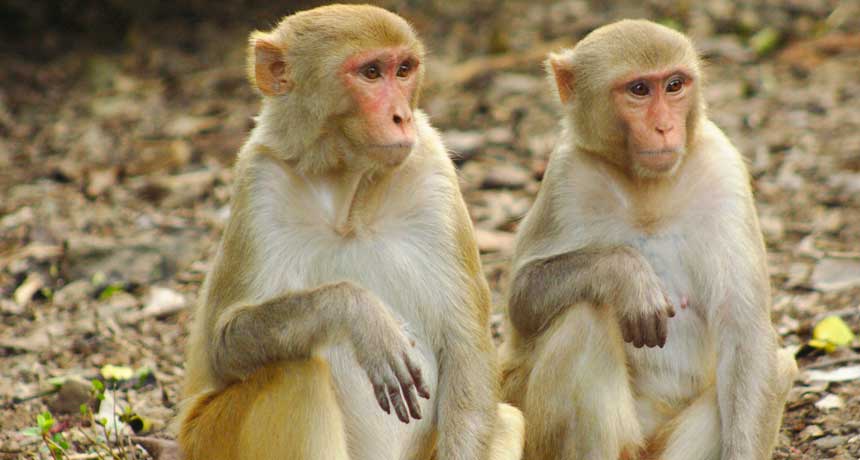Low social status leads to off-kilter immune system

Living on the bottom rungs of the social ladder may be enough to make you sick. A new study manipulating the pecking order of monkeys finds that low social status kicks the immune system into high gear, leading to unwanted inflammation akin to that in people with chronic diseases.
The new study, in the Nov. 25 Science, gets at an age-old question that’s been tough to study experimentally: Does social status alone change biology in a way that can make a person more healthy or more vulnerable to disease?
“We’ve known for years that human health and longevity are linked to socioeconomic status,” says Steve Cole, an expert in human social genomics at UCLA. This link often persists regardless of factors such as access to decent health care or clean water, but it’s hard to design studies to get at mechanism or causation, he says. “This study is very nice to see and it’s very consistent with other lines of research.”
To tease out the influence of rank on health, scientists turned to another highly social animal: the rhesus monkey. Evolutionary biologist Jenny Tung of Duke University and colleagues worked with 45 female monkeys at the Yerkes National Primate Research Center field station near Lawrenceville, Ga. The researchers arranged the monkeys into groups of five, adding monkeys one at a time, which reliably resulted in the oldest member dominating and the newest member having the lowest rank. These groups were maintained for a year during which the researchers noted behaviors and took blood samples to assess changes in cellular and gene activity associated with the monkeys’ social status.
Then the researchers rearranged the monkeys into different groups of five; this time grouping monkeys of the same social rank together. Again, the monkeys established pecking orders and the researchers observed behaviors and drew blood.
It was quite clear which monkeys were dominant and which were subordinate, says Tung. “The alpha female — no one’s messing with her,” Tung says. Low-ranking monkeys were harassed more and not only did they receive more flak, but they also lacked a shoulder to cry on. Subordinate monkeys participated far less in grooming behaviors, which typically promote feel-good social bonding.
The effects of rank turned out to be more than skin deep. Low-ranking monkeys had different proportions of immune system cells circulating in their blood, the researchers found. And gene activity within some of these cells was dialed up in the low-ranking monkeys. Together, the cellular and genomic activity resulted in a physiological profile that looks like chronic, harmful inflammation. This type of inflammation is the fertilizer that aids the development of many chronic diseases, such as Alzheimer’s, metastatic cancers and cardiovascular disease, says Cole.
Cells from the monkeys that were exposed to a bit of bacterial toxin to mimic infection also responded differently based on the monkey’s rank, the team found. Overall, the findings add to a body of work detailing how low social standing leads to elevated stress that harms the body, says Robert Sapolsky of Stanford University, an expert on the physiological effects of stress in primates who wrote a perspective in the same issue of Science.
“At the end of the day, being a chronically subordinate nonhuman primate and being a human mired at the bottom of the socioeconomic scale are similar in the most fundamental ways,” Sapolsky says. “You have remarkably little control and predictability in your life, your outlets for frustration are limited, and it’s relatively hard to access social support. That’s the prescription for chronic, stress-related maladies.”